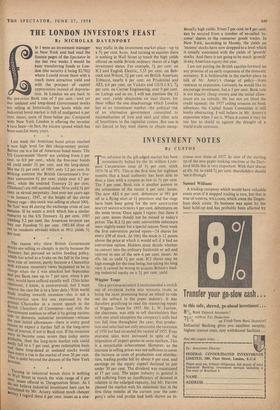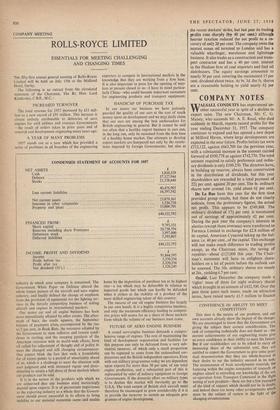INVESTMENT NOTES
By CUSTOS
rin HE advance in the gilt-edged market has been I momentarily halted by the £6 million Liver- pool Corporation issue of Si per cent. stock 1974-76 at 974. This is the first time for eighteen months that a local authority has been able to float a loan with a coupon as low as 51 per cent. The 5 per cent. Bank rate is another pointer to the attractions of the recent 6 per cent. issues. The new AEI 6 per cent. debenture at 981 got off to a flying start at lf premium and the stags have been busy going for the new ASSOCIATED BISCUIT MANUFACTURERS 6 per cent. debentures on the same terms. Once again I repeat that these 6 per cent. issues should not be missed at today's prices. The ICI 5+ per cent. convertible debenture were slightly easier for a special reason. Next week the first conversion period opens-24 shares for every £50 of stock. At 1061 the stock is 12 points above the price at which it would sell if it had no conversion option. Holders must decide whether to convert into the ordinary forthwith or sell and reinvest in one of the new 6 per cent. issues. At 45s. 6d. to yield 5+ per cent. ICI shares may be high enough for the time being, but taking the long view it cannot be wrong to acquire Britain's lead- ing industrial equity on a 5+ per cent. yield.
Wiggins Teape
On a previous occasion I recommended a switch out of INVERESK PAPER into WIGGINS TEAPE as being the most promising horse'on which to ride out the setback in the paper industry. It was therefore gratifying to read the reassuring report of Wiggins Teape for 1957. Mr. L. W. Farrow, the chairman, was able to tell shareholders that with one small exception the company's mills had run full time throughout the year, that produc- tion and sales had not only overcome the recession of 1956 but had exceeded the record of 1955. Even overseas sales were increased in spite of the imposition of import quotas in some markets. This is a remarkable achievement. However, as the increase in selling prices was not sufficient to cover the increase in- costs of production and distribu- . tion, trading profits fell by about 9 per cent. and earnings on the equity capital declined to just under 30 per cent. The dividend was maintained at 17 per cent. The paper industry in general is still suffering from an insufficiency of demand in relation to the enlarged capacity, but Mr. Farrow pleased the market with his statement that in the first three months of the current year the com- pany's sales and profits had both shown an in- crease over those of 1957. In view of the starting up of the new paper-making machine at the Dart- ford Mills this is very important. With their shares at 45s. 9d. to yield 7+ per cent, shareholders should `see it through.'
Samuel Williams
A trading company whiCh would have valuable assets even if it stopped trading is rare, but that is true of SAMUEL WILLIAMS, which owns the Dagen- ham dock estate. Its business was upset by the Suez hold-up and has probably been affected by the recent dockers' strike, but last year its trading profits rose sharply (by 40 per cent.) although heavier taxation reduced the net profit to a re- covery of only 20 per cent. The company owns the nearest ocean oil terminal to London and has a valuable wharfinger, warehouse and lighterage business. It also trades as a construction and trans- port contractor and has a 40 per cent. interest in the Hudson firm of coal exporters and fuel oil distributors. The equity earnings amounted to nearly 30 per cent. covering the maintained 15 per cent. dividend about twice. At 9s. 3d. the 5s. shares are a reasonable holding to yield nearly 81 per cent.



































 Previous page
Previous page